2020 February
2018 December August June February
2017 December September June March
2016 November August June March
2015 December October July May February
2014 December October July April February
2013 December October August May February
2012 December September July April February
2011 December September July April February
from the December, 2012 issue of Kiai!
Men Against Gender Violence in Bangladesh
By M. Sophia Newman
M. Sophia Newman, an alumni and friend of Thousand Waves, is a Fulbright Scholar currently studying in Bangladesh. The following piece is reprinted with permission from her blog, msophianewman.com.
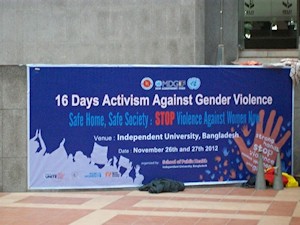 Man, life in Bangladesh can be satisfying.
Man, life in Bangladesh can be satisfying.
Today I met my tutor in the library for a typical study session. While I finished up some writing practice, she went to the restroom. She came back and told me that there was something called a jatra in the courtyard. She explained that this is a traditional Bengali community theater sort of event, often with music. I finished up my worksheet and we left to check it out.
The jatra turned out to be part of the university's participation in the worldwide 16 Days of Activism Against Gender Violence, which is happening now.
The play involved a group of local actors, including a young girl. The story was initially a bit hard to follow, partly because of my insufficient Bangla skills, but also because of the poor quality of the sound system. But the girl's character had a pretty clear role: she panicked, a lot.
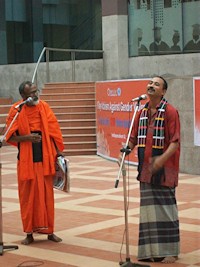
Elder/man of religious uprightness (left) and creepy abuser guy (right).
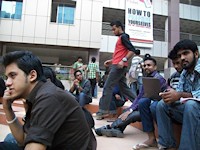
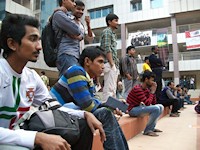
Crowd.
The theme became clear to me: this girl had suffered some sort of abuse. The abuser was also easy to identify. He was the creepy dude who repeatedly yelled at the girl. From there, the rest was fairly easy to sort out: the other men in the group played various community members, the single grown woman was a concerned NGO or social worker, and the older bearded man dressed in some kind of traditional orange robe was the voice of authority and/or reason, there to deliver the play's moral lesson.
The details were a little harder to grasp, but my tutor filled me in: the dialogue was about how the abuser had raped the girl, not just yelled at her. The topic was about what to do.
I was pretty happy to see an honest discussion about this topic in Bangladesh, where I have noted the importance of violence against women in my health research.
The best part, though, was what I noticed next.
I looked around at the crowd filling the outdoor pavilion, and I realized that it was nearly all guys. Although many women are students, faculty, and staff at the university, the crowd that had self-selected to watch this performance was nearly 100% male.
Seeing with American eyes, I found the all-male crowd unusual. For a long time, I've looked at the discourse on violence against women in America and wondered where all the men were.
The way we talk about rape in America is strange. People almost always say, "She was raped." It's a passive voice sentence construction, the way of speaking that eliminates mention of the person responsible for an action. In English, we usually favor the active voice, which puts the responsibility front and center. The correct sentence, rendered in the typical active voice, would be "Somebody raped her."
This is a big difference. Somebody is a real person. Somebody has a name and an address. Somebody, some creepy guy, made a choice to commit a felony for which he is personally responsible under law. A woman doesn't just manifest a state of being a rape survivor out of the thin air, as though it were some mysterious disease.
It hasn't escaped me that in America, the majority of rapes are not prosecuted, even if the proper medico-legal evidence is collected to enable a prosecution. We do tend to treat sexual violence as though it is some mysterious disease that women manifest out of thin air. We have become passive not just in voice but in action.
No one asks where all the men – those specific somebodies who are personally responsible for rapes – are. No one has ever explained to my satisfaction why rape is a women's issue, when 99% of rapists are male. What's wrong with these guys? Isn't it their job to solve the problem they are perpetuating? Why can't I live my life in safety, without being forced to untangle violence that my whole gender doesn't even do?
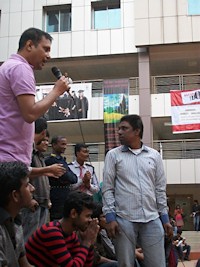
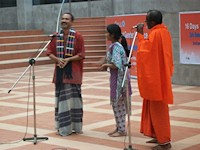
Hands off, pal.
Far away from America, I watched the male crowd watch the play. I don't want to accuse these men of having done anything violent in their personal lives, because I have no way of knowing that. What I do know is that this nearly all-male crowd was thoughtfully dealing with violence against women. I was noticing that these Bengalis – whose language, incidentally, uses passive voice sentence construction almost exclusively – were putting the responsibility right where it belonged.
The crowd participation led by the elder in orange was particularly lively. It involved talking a bunch of stuff to the rapist and ridiculing him. (I said nothing, but I didn't mind when the elder character in orange asked me, the lone foreign woman, "Ki ki mone hoy, Apa?" meaning "What do you think, sister?")
My favorite part was when the girl came to the stage to say one last thing, and the creepy guy put his hand on her -- and she flicked it off immediately, to the crowd's cheers. Right on, little ninja.
The classroom reading that day had been about Bangladesh's place as a stand-out developing nation, an example to other low-income countries. As I left the play, I thought: maybe it's not just an example among developing nations.
My country, after all, is where elected officials talk a bunch of crap about how "some girls, they rape so easy." The severity of violence against women is severe and troubling in both places, but in solving it, Bangladesh might be serving America a pretty good example.
Good for them. Good for us, too.
Thanks, Bengali dudes.
